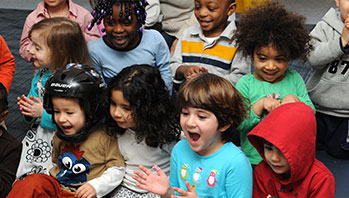MA Standards:
English Language Arts/Speaking and Listening/SL.PK.MA.1a: Observe and use appropriate ways of interacting in a group (e.g. taking turns in talking, listening to peers, waiting to speak until another person is finished talking, asking questions and waiting for an answer, gaining the floor in appropriate ways).
English Language Arts/Foundational Skills/RF.PK.MA.2: With guidance and support, demonstrate understanding of spoken words, syllables, and sounds (phonemes).
Head Start Outcomes:
Social Emotional Development/Self-Regulation: Follows simple rules, routines, and directions.
Language Development/Receptive Language: Attends to language during conversations, songs, stories, or other learning experiences.
Literacy Knowledge/Phonological Awareness: Identifies and discriminates between separate syllables in words.
PreK Learning Guidelines:
English Language Arts/Language 1: Observe and use appropriate ways of interacting in a group (taking turns in talking; listening to peers; waiting until someone is finished; asking questions and waiting for an answer; gaining the floor in appropriate ways).
English Language Arts/Reading and Literature 12: Listen to, recite, sing, and dramatize a variety of age-appropriate literature.
English Language Arts/Reading and Literature 8: Listen to, identify, and manipulate language sounds to develop auditory discrimination and phonemic awareness.
Greeting Song: “If Your Name . . .” #5

© Commonwealth of Massachusetts, Department of Early Education and Care (Jennifer Waddell photographer). All rights reserved.
ELA Focus Skills: Active Listening, Phonological Awareness (Segmenting)
Tell children you are going to sing “If Your Name . . .” to them again. Explain that you want them to wiggle when it is their turn.
- Sing the first verse of “If Your Name . . . .”
- Signal children who have one syllable in their names to wiggle in their seat. When all children with one syllable in their names are wiggling, say each name aloud and ask the child to stop wiggling.
- Then say each name again and have the group clap it as they repeat it after you. Say, If it is your name we are clapping, then you can wiggle one more time!
- Continue the process until all children in the room have had a chance to wiggle to their names.
If Your Name . . .
(sung to the tune of “If You’re Happy and You Know It”)
If your name has one word part, please wiggle.
If your name has one word part, please wiggle.
If your name has one word part,
And you really want to show it,
If your name has one word part, please wiggle.
Add verses for two, three, four, and five word parts as needed.
Social Emotional Tip: Help children learn to adapt to greater changes in routines and new situations by making slight changes in how you do familiar routines.
Adaptation: If very young children have trouble wiggling their whole bodies, then just have them wiggle their fingers.
